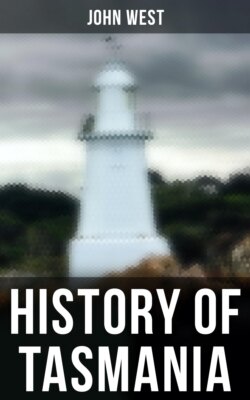Читать книгу History of Tasmania - John West - Страница 11
На сайте Литреса книга снята с продажи.
FOOTNOTES:
Оглавление[33] Wentworth's New South Wales, p. 210.
[34] Flinders, vol. i.
[35] Narrative: published by authority of the Admiralty, 1818.
[36] "We arrived in October, 1803: my pen is not able to describe half the beauties of that delightful spot: we were four months there. Much to my mortification, as well as loss, we were obliged to abandon the settlement, through the whim and caprice of the Lieutenant-Governor: additional expense to government, and additional loss to individuals, were incurred by removing to Van Diemen's Land, which can never be made to answer. Port Phillip is my favorite, and has my warmest wishes. During the time we were there, I never felt one ache or pain, and I parted from it with more regret than I did from my native land." The following is the endorsement of this letter:—"Dated May 23rd, 1805; received October 10th, 1805—half a year! From an officer's wife, Mrs. Hartley (quere Hopley?), to her sister."—Collection of Letters, for a History of New South Wales. By a Merchant. London: Valpy, 1812.
[37] Report of Commons on Transportation, 1812.
[38] Phillip's Voyage, p. 95.
[39] The reader will not be displeased to see the whole passage. On the 22nd of March, 1775, upon moving his resolutions for conciliation with America, Edmund Burke thus addressed the house:—
"Mr. Speaker—I cannot prevail on myself to hurry over this great consideration. It is good for us to be here. We stand where we have an immense view of what is, and what is past. Clouds indeed, and darkness rest upon the future. Let us, however, before we descend from the noble eminence, reflect that this growth of our national prosperity has happened within the short period of the life of man: it has happened within sixty-eight years. There are those alive whose memory might touch the two extremities. For instance, my Lord Bathurst might remember all the stages of the progress. He was in 1704, of an age, at least, to be made to comprehend such things. He was then old enough—acta parentum jam legere et quæ sit poterit cognoscere virtus. Suppose, Sir, that the angel of this auspicious youth, foreseeing the many virtues which made him one of the most amiable, as he is one of the most fortunate men of his age, had opened to him in vision, that when in the fourth generation the third prince of the house of Brunswick had sat twelve years on the throne of that nation, which (by the happy issue of moderate and healing councils) was to be made Great Britain, he should see his son, Lord Chancellor of England, turn back the current of hereditary dignity to its fountain, and raise him to higher rank of peerage whilst he enriched the family with a new one. If, amidst these bright and happy scenes of domestic honor and prosperity, that angel should have drawn up the curtain and unfolded the rising glories of his country, and whilst he was gazing with admiration on the then commercial grandeur of England, the genius should point out to him a little speck, scarce visible in the mass of national interest—a small seminal principle rather than a formed body—and should tell him: Young man, there is America, which at this day serves for little more than to amuse you with stories of savage men and uncouth manners; yet shall, before you taste death, show itself equal to the whole of that commerce which now attracts the envy of the world. Whatever England has been growing to by a progressive increase of improvement, brought in by varieties of people, by succession of civilising conquests, civilising settlements in a series of seventeen hundred years, you shall see as much added to her by America in the course of a single life! If this state of his country had been foretold to him, would it not require all the fervid glow of enthusiasm to make him believe it? Fortunate man, he has lived to see it: fortunate indeed, if he lives to see nothing that shall vary the prospect, and cloud the setting of his day."—Parl. Hist., vol. xviii. p. 487.
[40] Edinburgh Review, 1803.
